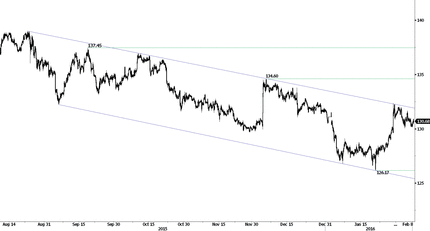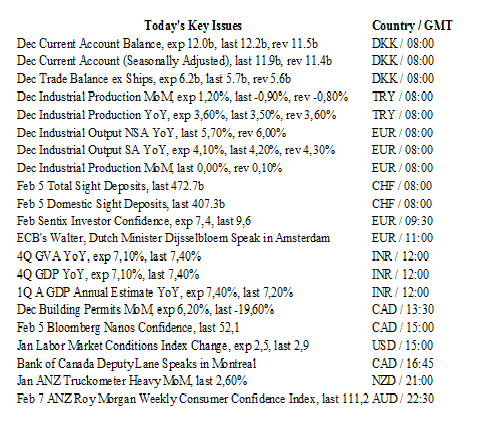China FX Reserves Shrink Less Than Expected
Swissquote Bank Ltd | Feb 08, 2016 07:03AM ET
Forex News and Events
Market waiting for Yellen
With Chinese markets closed for the week and a very light economic calendar, investors will watch Fed Chairwoman Yellen’s two upcoming appearances with interest. The latest job report from the US gave renewed hope for the Fed to carry on with its tightening process. Indeed, the uptick in wage growth (+2.5% y/y verses 2.2% expected) will likely consolidate the Fed’s decision to implement another rate hike. However, considering the current context we remain rather cautious as this positive trend in wage pressure is only at an early stage. It will also be interesting to see how the market’s turmoil and the highly volatile environment has affected Fed thinking. For now, investors are trying to figure out whether it was a good or a bad report - as NFP missed expectations - and are waiting for cues from the Fed to confirm this.
Small reserves fall but heightened concerns
Risk appetite was able to rebound on the less negative Chinese data, yet uncertainty persists. China’s reserves fell less than expected, as the PBoC data reported a decline of $99.5bn, below consensus of $120bn. However, this slower decline has not stopped the market chatter, calling for further RMB devaluations.
Perhaps the strongest argument why the decline was not deeper and further expectations for devaluations is that policymakers have clearly and aggressively intervened in the forward market. Forwards do not show up in the reserves data until contract expiry. Therefore, the likelihood that the headlines release underestimated the significant intervention and capital flight in January is high.
That said, we continue to believe the Chinese authorities have the firepower to stabilize the RMB, suggesting additional devaluations are unlikely. In the past 18 months FX reserves have declined by roughly $800bn, a significant number, however China still has sizable reserves of $3.2trn. The current markets expectations are that the strategy of FX and bond price control is unfeasible (judging from price on long-dated risk reversal), however, this is based on current capital flight does not tapper.
We remain optimistic that the monetary and policy action will begin to manifest itself in firm Chinese data. With fundamentals less pessimistic outflow should slow.
Bank of Japan: Current account balance keeps on declining
Japan’s current account balance shrank to 960.7 billion yen in December from 1143 billion yen and well below forecasts of 1051 billion yen. Yet, the account balance is in surplus for the 18th consecutive month. Still, cheap energy imports and the overall weakness of the yen are helping to maintain a decent account surplus.
Indeed, in the aftermath of the Fukushima disaster in 2011, Japan relied more on energy imports as nuclear reactors were systematically shut down, so lower oil prices have worked out well in terms of the balance of payments so far. At the same time, the continued weakening of the Japanese currency has spurred overall exports, which, nonetheless, suffered a third straight month decline in December due to China’s economic slowdown. China's demand for steel and semiconductors have fallen and as a result Japanese exports are down 8.0% from last year.
We believe that the current account balance, even though positive, will keep on declining and we forecast that the surplus era will end up by year-end, marking a recession from which effects can already be seen in Japan (mixed GDP). In the event that oil prices pick up, the current account may go negative even sooner.
EUR/JPY - Monitoring The Downtrend Channel


The Risk Today
EUR/USD EUR/USD is now consolidating after its last week's sharp bullish move. Daily resistance lies at 1.1387 (20/11/2015 high). Hourly support may be found at 1.0711 (05/01/2016 low). Yet, expected to show further consolidation. In the longer term, the technical structure favours a bearish bias as long as resistance holds. Key resistance is located region at 1.1453 (range high) and 1.1640 (11/11/2005 low) is likely to cap any price appreciation. The current technical deteriorations favours a gradual decline towards the support at 1.0504 (21/03/2003 low).
GBP/USD GBP/USD's short-term momentum is pausing Hourly resistance can be found at 1.4668 (08/02/2016 high). Hourly support can be found at 1.4081 (21/01/2015 low). Expected to show further increase. The long-term technical pattern is negative and favours a further decline towards the key support at 1.3503 (23/01/2009 low), as long as prices remain below the resistance at 1.5340/64 (04/11/2015 low see also the 200 day moving average). However, the general oversold conditions and the recent pick-up in buying interest pave the way for a rebound.
USDJPY USD/JPY is pausing around 117.00 and is still trading in a range from 116.00 from 122.00. Hourly resistance lies at 123.76 (18/11/2015 high). Hourly support lies can be found at 115.98 (20/01/2016 low). Expected to show further decline. A long-term bullish bias is favored as long as the strong support at 115.57 (16/12/2014 low) holds. A gradual rise towards the major resistance at 135.15 (01/02/2002 high) is favored. A key support can be found at 116.18 (24/08/2015 low).
USD/CHF USD/CHF is pausing below parity. Hourly support is located at 0.9786 (14/12/2015 low) and hourly resistance can be found at 1.0328 (27/11/2015 high). Expected to show continued decline. In the long-term, the pair has broken resistance at 0.9448 and key resistance at 0.9957 suggesting further uptrend. Key support can be found 0.8986 (30/01/2015 low). As long as these levels hold, a long term bullish bias is favoured.
Trading in financial instruments and/or cryptocurrencies involves high risks including the risk of losing some, or all, of your investment amount, and may not be suitable for all investors. Prices of cryptocurrencies are extremely volatile and may be affected by external factors such as financial, regulatory or political events. Trading on margin increases the financial risks.
Before deciding to trade in financial instrument or cryptocurrencies you should be fully informed of the risks and costs associated with trading the financial markets, carefully consider your investment objectives, level of experience, and risk appetite, and seek professional advice where needed.
Fusion Media would like to remind you that the data contained in this website is not necessarily real-time nor accurate. The data and prices on the website are not necessarily provided by any market or exchange, but may be provided by market makers, and so prices may not be accurate and may differ from the actual price at any given market, meaning prices are indicative and not appropriate for trading purposes. Fusion Media and any provider of the data contained in this website will not accept liability for any loss or damage as a result of your trading, or your reliance on the information contained within this website.
It is prohibited to use, store, reproduce, display, modify, transmit or distribute the data contained in this website without the explicit prior written permission of Fusion Media and/or the data provider. All intellectual property rights are reserved by the providers and/or the exchange providing the data contained in this website.
Fusion Media may be compensated by the advertisers that appear on the website, based on your interaction with the advertisements or advertisers.